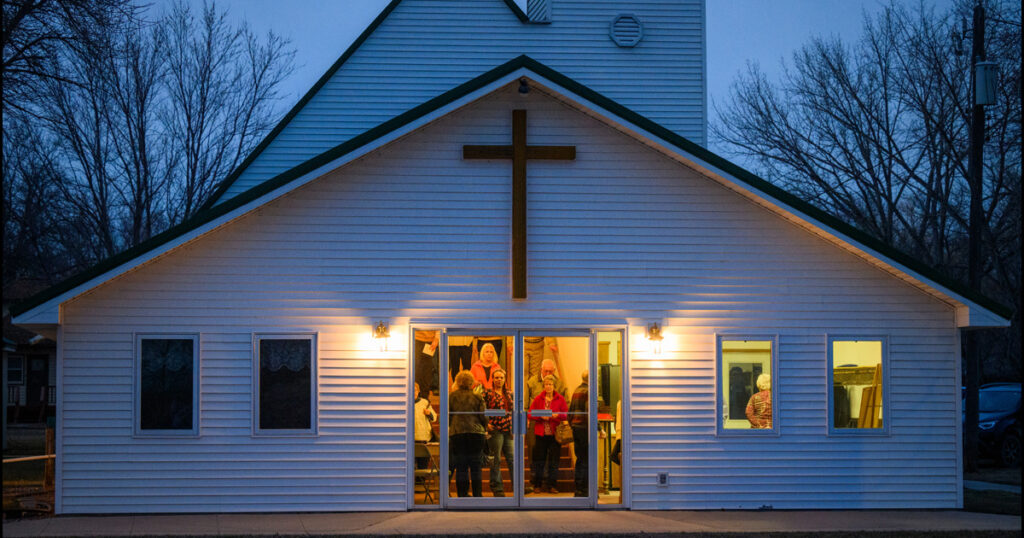By Julianna Shults
In my years of writing and speaking about youth ministry, one statement has gotten more looks of surprise and skepticism than others: “A congregation can have healthy youth ministry even if they have two or three youth.”
I make this statement when sharing the Seven Practices of Healthy Youth Ministry, designed by LCMS Youth Ministry after careful study of Scripture, Lutheran theology, research and practitioners. Each practice is something any congregation, regardless of location, resources or size can work toward in order to faithfully and intentionally engage teens.[1]
Youth ministry in small congregations is not out of the ordinary in the LCMS. In 2020, LCMS Youth Ministry did a survey that found 13% of LCMS youth leaders regularly reported interacting with one to three high school youth a month. Another 20% said they connected with between four and six. We pray that these numbers would grow. Yet we should take advantage of the time we have with the teens we already have, to support and foster them as disciples of Jesus for life.
The idea of youth ministry may conjure visions of large “youth group” activities: large-scale games, stacks of pizza, Bible studies with multiple small groups each with their own leader, all in a bright room designed for young people. But this isn’t realistic for all congregations. Nor are these things essential for supporting young people in the Christian faith. At the core, healthy youth ministry is about the Gospel of Jesus. Vibrant youth ministry happens when youth are engaged with supportive adults and parents as they deeply understand their baptismal faith. This can happen in congregations of all sizes.
Youth ministry is critical because it provides a way for teens to be seen, known and valued. Teens may know God’s love, presence and forgiveness, but they are also inundated with misleading messaging from media, peers, coaches and others about who they are. Congregational youth ministry helps root youth in worship, Bible study and prayer, and surrounds them with adults who point them back to Jesus.
“I grew up in smaller churches and we didn’t have a big youth ministry,” said DCE KerriAnn Schmidt. “My high school youth group was led by a teacher with a big heart for youth who volunteered. It wasn’t anything big or flashy, but we knew he cared about us, and we built a solid foundation in the Word of God.”
Small congregations often create powerful youth ministry by simply knowing and caring for each teen individually. Fewer youth may mean adults can more easily build mutual trust and be counted on during the tumultuous teen years. Even after high school, small congregations are often successful at maintaining relationships with young people.
“While children in small congregations may not have many peers their own age, they do get extra opportunities to develop meaningful relationships with adults in the church. These relationships will help them to remain grounded in the faith and to know that they are loved and cared for. An easy way for a congregation to show love to their children is to attend their games, concerts or other activities. This small, tangible step, can mean the world to a child and help them to see the church in a bigger way,” said the Rev. Ben Meyer.
Youth ministry also provides space for youth to discover their unique vocations while developing healthy independence and setting priorities for the future. Small congregations have many ways for youth to step into service and leadership, which helps them see their place and value in the church. They also see adults modeling the Christian life as teens practice making worship, prayer and contributing to the congregation ongoing priorities.
Practically, small congregation youth ministry can be creative in programming. Consider partnering with other churches in your circuit on a regular basis to provide developmentally appropriate space for them to build community and study God’s Word. Support youth in attending district and national youth events or servant events. Intentionally provide both intergenerational opportunities and age-specific space for them to mature in their understanding of God and the church. Small congregations can capitalize on relationships built during service or confirmation programming to create meaningful mentorships with adults.
The reality is that if you have even one teen in a congregation, there is youth ministry. It is up to each congregation to make choices that intentionally foster the faithful care of young people. We celebrate small congregations that have or will have vibrant and engaging youth ministry.
More resources:
In this story, two smaller congregations combined to benefit each other: https://www.youthesource.com/2024/12/partners-in-the-gospel-bringing-two-different-youth-groups-together/
This article discusses how you can do healthy youth ministry when you combine both junior and senior high youth ministry: https://www.youthesource.com/2022/04/mind-the-age-gap-joys-and-challenges-of-combined-junior-and-senior-high-ministries/
Encouragement for rural and small town youth leaders: https://www.youthesource.com/2015/10/where-two-or-three-are-gathered-rural-and-small-town-youth-ministry/
[1] To read more about the Seven Practices of Healthy Youth Ministry, go to youthesource.com/seven-practices.
Cover image: LCMS Communications/Erik M. Lunsford





A friend told me that she receives daily devotions from Lutheran Witness. Is this available for anyone? I’m a lifelong Lutheran and use Portals of Prayer for my daily devotions but wouldn’t mind a second source. Thank you. May God continued to bless your ministry.
Cathy,
Greetings. We wish we could provide daily devotions at The Lutheran Witness, but currently do not have that capacity. Perhaps your friend was referring to Portals of Prayer. LW is often mistaken for a variety of other publications.
Sorry to be the bearer of bad news.
My small congregation recently began coordinating with two other small congregations to take turns hosting youth events — one event a month. So far, the coordinators have been very pleased with the level of youth participation.
From personal experience, I appreciate the challenge of trying to have youth activities that appeal to a range of ages. During my junior and senior years in high school, my family worshipped in a small congregation whose youth group was open to grades 7-12. But while I was taking advanced placement courses, applying to college, learning to drive, and wondering how to start a conversation with that girl I admired, it seemed to me that congregational leadership did not fully appreciate the significant differences between the 7th graders and the 12th graders. Not keen on being lumped together with the other “kids,” I might have gone to one youth event before deciding that the youth group was not for me.
I am convinced that by involving youth early in truly meaningful and valuable service is important. After years in which youth have been primarily recipients of religious instruction, the joyful discovery that they can contribute significantly along with adults can foster an attitude of being “zealous for good works” (Titus 2:14 ESV). Some youth-related activities that I have appreciated:
• A non-Lutheran church near me trains selected older high school students to mentor children during Bible class.
• One church had a Saturday event involving knitting caps for people being treated for cancer. Youth worked alongside older church members on the assembly line.
• Another church had a team of youth and adults visit older citizens who were having difficulty maintaining the yards around their house, and in a few hours wielded an assortment of tools to restore the appearance of each selected property.
• At my church, our tiny youth group continues to collect specified items for care bags that every church member is invited to give to needy people they encounter. (I’ve gladly given away three of them already.)
• Our interim pastor had two young men frequently read printed prayers during the service.
• A layman who plays the french horn has started a brass quartet involving pre-teens, and no matter the quality of performance, members of the congregation seem to be delighted that the kids are stepping up and becoming more confident. I am sure I am one of many who has thanked them for their contributions.
Paul, I love to hear the coordination of your local congregations. We are “better together” and I hope this investment is a blessing to all involved.
Also, thanks for sharing the ideas congregations are doing and can do to connect young people in meaningful opportunities to serve and lead. LCMS Youth Ministry research and experience backs you up! We are thankful for congregations who support young people through service that puts faith into action. It’s a great way to provide times of fellowship and acts of care and mercy for our neighbor. Thank you for your prayers and service to young people in your congregation and community!